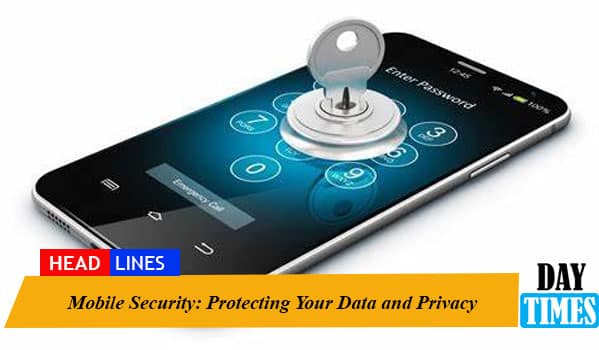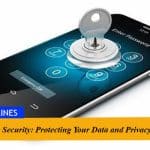Smartphones have become important to our daily lives. They store our personal information, facilitate communication, and allow us to access the internet on the go. As a result, ensuring the security of our mobile devices is more critical than ever. If you want to know about processors or other smartphone specs despite these security issues, you can visit mobilemarkaz. In this blog post, we’ll explore the different aspects of mobile security and provide tips on protecting your data and privacy.
The Importance of Mobile Security
Mobile security is crucial for several reasons:
Personal Information: Our smartphones store a wealth of personal information, including contacts, messages, emails, photos, and financial details. If our data fall into unsafe hands, it can be wrongly used for identity theft, fraud, or other malicious activities.
Online Accounts: Many people use smartphones to access online accounts, e.g. social media, email, and banking. If a hacker gains control of these accounts, they can wreak havoc on your digital life and potentially cause financial harm.
Privacy: With the rise of location-based services and social media, maintaining privacy on mobile devices has become increasingly challenging. Ensuring your device is secure can help protect your personal information and prevent unauthorized access to your private data.
Malware: Mobile malware is rising, with hackers continuously developing new ways to infiltrate and exploit smartphones. Protecting your device from malware can prevent the loss or theft of sensitive data and help safeguard your privacy.
With these concerns in mind, let’s delve into some other steps you should take to improve the security of your mobile device.
Tips for Protecting Your Data and Privacy
Keep Your Operating System and Apps Up-to-Date
The most vital aspect of mobile security is ensuring that your device’s operating system (OS) and installed apps are up-to-date. Android and iOS regularly release security updates and patches to fix vulnerabilities and enhance device security. Try to install these updates as soon as they become available.
Similarly, app developers frequently update their apps to address security concerns and improve functionality. Regularly updating your apps can help protect your device from malware and other threats.
Use Strong, Unique Passwords and Enable Two-Factor Authentication
These passwords for all your online accounts are essential for safeguarding your data. You must avoid using easily guessable passwords, such as “123456” or “abcde”; instead, opt for a combination of letters, numbers, and symbols. Additionally, never reuse the same password across multiple accounts, as this can leave you defenseless if one account is compromised.
TFA adds a layer of protection by requiring verification in addition to your password. This can be a fingerprint, a text message code, or an authentication app. Enabling 2FA on your accounts can significantly reduce the risk of unauthorized access.
Be Cautious with Public Wi-Fi Networks
Public Wi-Fi networks, such as airports, coffee shops, and hotels, can be convenient for internet access. However, they can also pose significant security risks. Hackers can intercept data transmitted over unsecured public Wi-Fi networks, potentially gaining access to your private information.
To protect your data while using public Wi-Fi, consider using a virtual private network to encrypt your internet connection. A VPN can help protect your data and maintain your privacy while browsing the web.
Install a Mobile Security App
Numerous mobile security apps are available for Android and iOS devices, offering features such as malware scanning, remote lock and wipe, and phishing protection. Installing a reputable mobile security app can help protect your device from threats and give you peace of mind.
Some popular mobile security apps include:
- Norton Mobile Security
- McAfee Mobile Security
- Avast Mobile Security
- Lookout Security & Antivirus
Before installing a security app, research its features and read user reviews to ensure it’s a reliable and effective solution.
Be Wary of App Permissions
When installing apps, please pay close attention to the permissions they request. For example, many apps require access to certain features or data on your device, such as your location, contacts, or camera. While some permissions are necessary for an app to function correctly, others may be unnecessary or invasive.
Before granting permission to an app to access your data, ask yourself if it genuinely needs that information. If unsure, consider researching the app further or seeking an alternative with fewer permission requests.
Lock Your Device with a Passcode, Pattern, or Biometric Authentication
One simplest yet most effective way to protect your data is to lock your device with a passcode, pattern, or biometric authentication method (such as fingerprint or facial recognition). This can help prevent unauthorized access to your device and secure your personal information.
In addition to enabling a lock screen, consider setting up a feature that automatically locks your device after a period of inactivity. This can provide added security if you accidentally leave your phone unlocked and unattended.
Regularly Backup Your Data
Regularly backing up your data is vital for protecting your information from device loss, theft, or malfunction. Android and iOS offer built-in backup solutions to store your data in the cloud securely.
For Android, Google Drive provides automatic backups of your app data, contacts, and more. On iOS, iCloud allows you to back up your device data, including photos, messages, and settings.
Regularly backing up your data ensures your information is safe and easily recoverable in an emergency.
Conclusion
Mobile security is an essential aspect of our digital lives that should not be overlooked. Following these tips outlined in this blog post, you can proactively protect your data and privacy on your mobile device. Maintaining your device’s security is an ongoing process, and staying vigilant and informed about potential threats is crucial for safeguarding your personal information.


























































